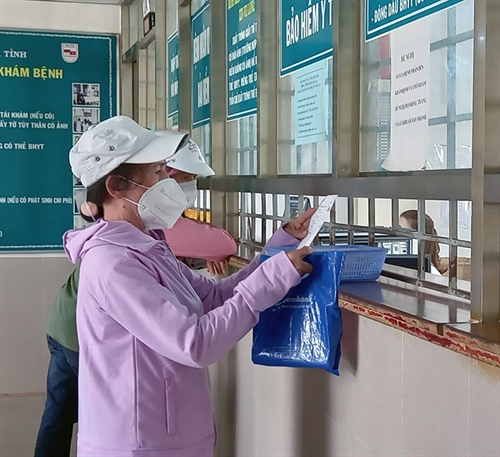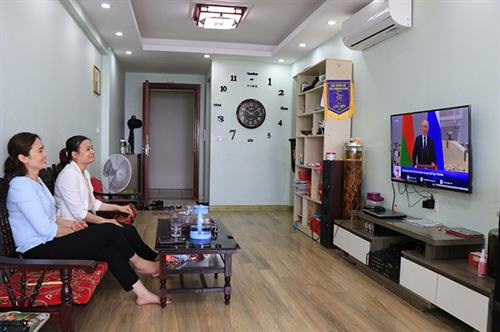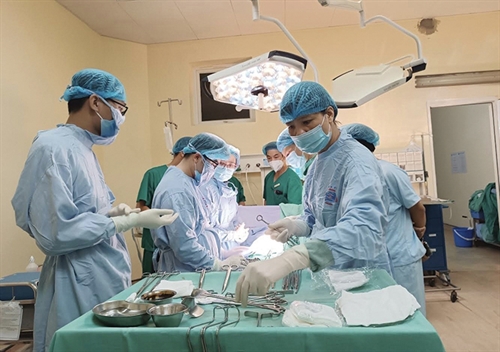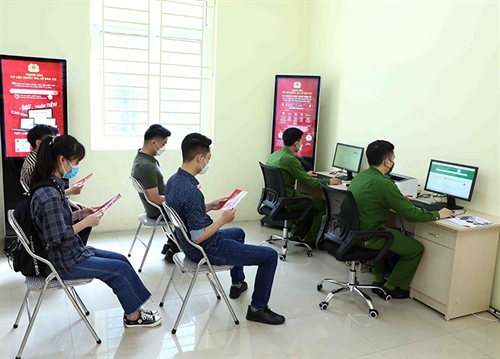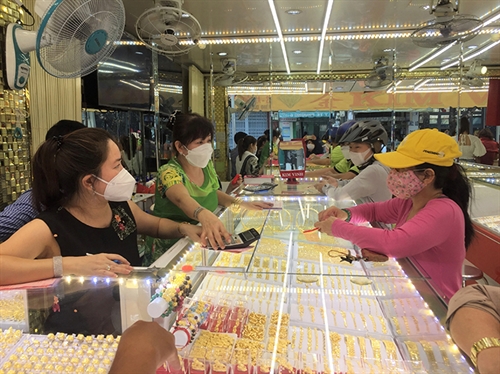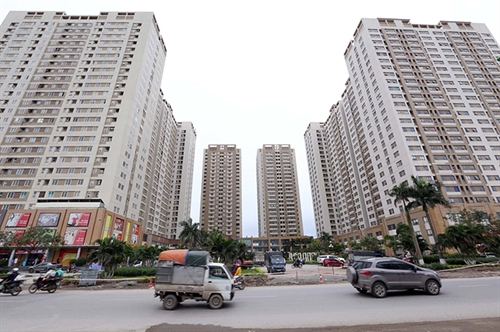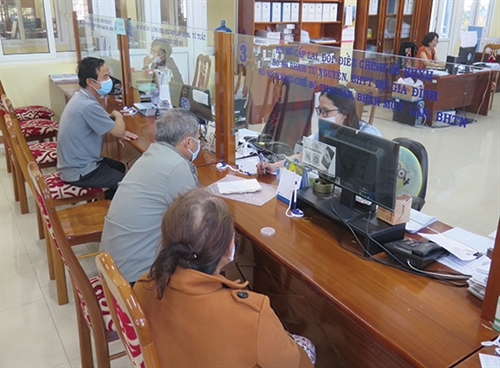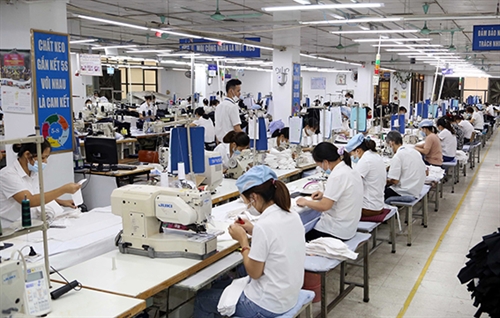The outline of the first-ever Law on Gender Identity of Vietnam, a legislative initiative of National Assembly deputy Nguyen Anh Tri, has been recently submitted to the National Assembly Standing Committee and posted online for public comment. Earlier in last September, after several delays, the Ministry of Health finally submitted to the Government a dossier on the formulation of the draft Law on Gender Reassignment, which contains many noteworthy proposals on the rights and obligations of transgender people, including the right to gender reassignment, the right to marriage, and the right to change legal gender.
These are manifestations of legislators’ and policymakers’ efforts to affirm the right to gender self-identification and gender reassignment as one of the fundamental personal rights of citizens and ensure equality among citizens, regardless of their gender identity.
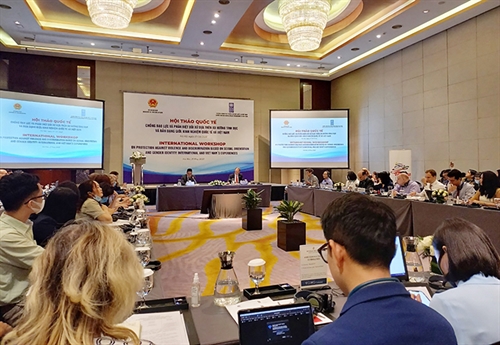 |
| A workshop on protection against violence and discrimination based on sexual orientation and gender identity__Photo: https://vov2.vov.vn |
Necessity for a legal corridor to govern the transgender-related issues
Researches in the world show that the LGBT (lesbian, gay, bisexual, and transgender) community in general accounts for 3-7 percent of the global population. Meanwhile, the group of transgender people, including those who have undergone gender-affirming surgery or hormone therapy, makes up 0.3-0.5 percent of the population. This means that Vietnam, with a population of approximately 98.5 million by November 2021, has 300,000-500,000 transgender people for the time being.
In Vietnam, the right to gender reassignment is recognized in Article 37 of the 2015 Civil Code which states that a person whose gender has been reassigned has the right and obligation to register for change of his/her civil status information and has his/her personal rights suitable to the reassigned gender in accordance with law. However, until now, competent authorities have yet to issue any legal documents or professional instructions guiding the implementation of this provision, resulting in transgender people facing many difficulties in their everyday life.
According to a survey conducted in 2017 by the Institute for Studies of Society, Economics and Environment (iSEE) - a local non-governmental organization working toward the rights of minority groups in society, up to 59.6 percent of transgender people who are currently taking hormones have neither taken gender identity tests nor received counseling before starting the therapy. They instead get advices from hormone sellers who in most cases are not qualified physicians from licensed medical centers. Many transgender people choose to inject hormones themselves at home or with the support of friends or acquaintances. Although there are incomplete data but findings from community consultations show that transgender people are encountering not a few health problems relating to self-administration of gender-affirming hormones such as abscesses, drug shock, or even death.
As evaluated by the Ministry of Health, transgender people are unable to live according to their desired gender. Most of them are discriminated against and, therefore, meet difficulties in study, work and employment. Some suffer “gender dysphoria” - the depression and anxiety caused by a mismatch between a person’s gender identity and his/her biological sex assigned at birth.
According to iSEE Director Luong The Huy, social constraints on transgender people have been gradually “loosened” but they are still subject to limitations of not a few civil rights and human rights. Huy told Tuoi Tre (Youth) newspaper, citing the lack of a law on gender reassignment as the main reason behind the situation.
There are many examples that can be cited as illustrations for the difficulties encountering transgender people in Vietnam.
After five painful gender reassignment surgeries in Thailand, V.H., in Dong Nai province, aged 32, becomes a beautiful lady as she had always wished since she was a little child. In order to start a new life, H. files an application for change of the legal gender from male to female but is refused. Even her request for change of her birth name to a more feminine name to match her appearance is not accepted.
More luckily than V.H., T.H.M., a 41-year-old transgender woman in Ho Chi Minh City, has managed to obtain a new citizen identity card granted under her new gender and a new name. However, T.H.M. still fails to have her birth certificate modified to suit her new identity and, as a result, can hardly carry out administrative or legal procedures which require the birth certificate like marriage registration or property division.
The situation is even worse for P.N.S., aged 44, another transgender woman in the country’s largest southern city. Born as a boy but since her childhood, S. has always been interested in wearing elegant dresses. When she grows up, S. wishes to get a gender affirmation surgery, but because of financial difficulty and health problems, she has to put this dream on hold and has to continue living as Mr. P.N.S. on paper though she is actually a woman - a “Ms.” in appearance.
Proposals on transgender people’s rights and obligations
It can be said that both drafts, the draft Law on Gender Identity and draft Law on Gender Reassignment, are formulated following the approach of upholding and guaranteeing citizens’ right to gender reassignment or recognition of gender identity and right to live with their desired gender in a lawful manner. This is also the aspiration of the LGBT community.
In light of this, the draft Law on Gender Identity, initiated by Nguyen Anh Tri, provides for gender identity; citizens’ right to recognition of gender identity and conditions and procedures for exercise of such right; and medical interventions for transgender people. The draft underlines that the State would recognize citizens’ gender identity and respect and create conditions for transgender people to perform gender reassignment with or without using medical measures and live according to their gender identity through recognizing citizens’ gender based on their gender identity.
Meanwhile, the draft Law on Gender Reassignment focuses more on the rights of transgender people, affirming that transgender people would have their honor, dignity, prestige, private life, personal secrets, family secrets and other privacy rights respected and protected.
Worthy of note, those whose gender identity mismatches their biological sex would have the right to request for recognition as transgender persons without having to take medical interventions for gender reassignment and, after recognized, they would be entitled to apply for change of civil status papers and, especially, to marry under their new legal gender. The draft law also affirms that the adjustment of civil status information of a legally recognized transgender person would not result in change of his/her civil rights and obligations as well as rights and obligations arising from marriage and family relations, including also child adoption.
As for those who decide to get gender-affirming surgery or therapy, they would be provided with psychological and medical counseling and support before, during and after the treatment process. Particularly, transgender people who have undergone gender-affirming genital surgery would not be obliged to take sterilization methods against their will.
The draft law also specifies conditions for taking gender-affirming hormone therapy or surgery. Accordingly, those who wish to get medical interventions for the purpose of gender reassignment must have complete biological sex, be aged at least full 16 years, in case of taking hormones, or full 18 years, if wishing to get surgery, have full civil act capacity, have a gender identity different from their biological sex, be not subject to therapy contraindications, and be single and mentally and physically fit. Particularly, those who seek treatment by hormone therapy at the age of between full 16 years and under 18 years must obtain the consent of their parents or guardians.-
